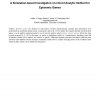Free Online Productivity Tools
i2Speak
i2Symbol
i2OCR
iTex2Img
iWeb2Print
iWeb2Shot
i2Type
iPdf2Split
iPdf2Merge
i2Bopomofo
i2Arabic
i2Style
i2Image
i2PDF
iLatex2Rtf
Sci2ools
EDM
2010
2010
Modeling Learning Trajectories with Epistemic Network Analysis: A Simulation-based Investigation of a Novel Analytic Method for
Epistemic games are designed to help players develop domain-specific expertise that characterizes how professionals in a particular domain reason, communicate, and act [1, 11]. To analyze the complex data that arise from these games, a novel analytic method grounded in social network analysis called epistemic network analysis (ENA) has been recently proposed [8, 9, 12]. In this paper, we report on preliminary results of a comprehensive simulation study that investigates whether ENA statistics are sensitive to players' differential learning trajectories throughout different game structures under different solution strategies. Preliminary results show a complex emerging picture of the conditions under which one ENA statistic can be suitable for this purpose.
| Added | 29 Oct 2010 |
| Updated | 29 Oct 2010 |
| Type | Conference |
| Year | 2010 |
| Where | EDM |
| Authors | Andre A. Rupp, Shauna J. Sweet, Younyoung Choi |
Comments (0)

